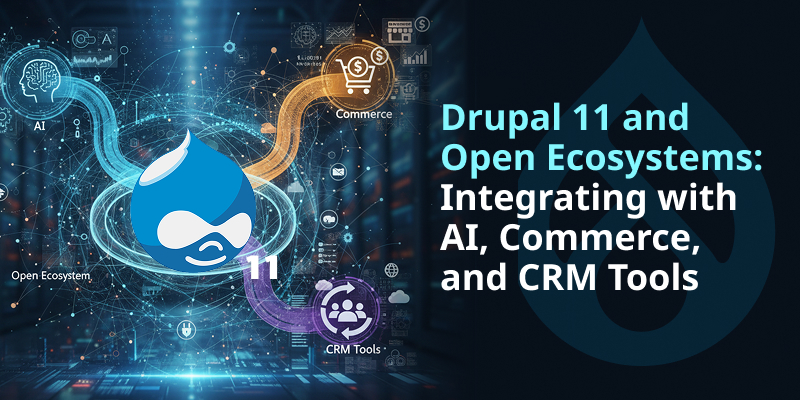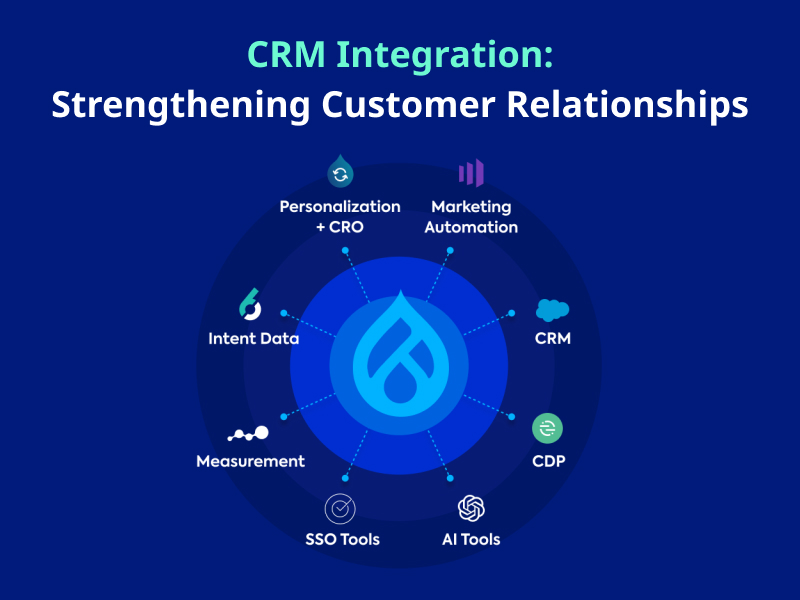Drupal 11 and Open Ecosystems: Integrating with AI, Commerce, and CRM Tools

The digital landscape is evolving faster than ever, and businesses need platforms that are adaptable, scalable, and future-ready. Managing content alone is no longer enough; organizations must deliver personalized experiences, streamline operations, and strengthen customer relationships across multiple channels.
Drupal 11 stands out as a strategic solution. Its open and extensible architecture enables seamless integration with AI, commerce platforms, and CRM tools, transforming a traditional CMS into a connected digital ecosystem. Notably, Drupal 11 now powers nearly 50% of all Drupal installations, reflecting strong enterprise adoption and confidence in its capabilities (Source). Its scalability and robustness make it a trusted choice for large, complex digital operations, with over 12% of the world’s top 10,000 websites relying on Drupal for their digital presence (Source).
By leveraging Drupal 11’s open ecosystem, businesses can build future-ready platforms that integrate AI-driven personalization, streamline commerce workflows, and consolidate CRM operations, all while maintaining security, performance, and agility.
AI Integration in Drupal 11

Artificial Intelligence is no longer a “nice-to-have.” It’s a core engine of business transformation. From real-time personalization to predictive modeling and workflow automation, AI reshapes how digital platforms operate. Drupal 11’s open ecosystem makes it easy to plug in AI-powered tools without custom-building everything from scratch, providing businesses with the agility to innovate quickly.
Personalized Content Delivery
AI enables Drupal 11 to tailor content in real time. By analyzing behavioral data and engagement patterns, businesses can serve hyper-relevant recommendations. This translates into higher retention and conversions. For instance, a university might offer course suggestions based on browsing history, while an online retailer can surface products aligned with previous purchases.
Predictive Analytics
With AI-powered analytics, businesses can anticipate customer behavior instead of reacting to it. Marketing and sales teams can identify churn signals, forecast demand, and align campaigns with user intent, allowing for sharper strategy and better ROI.
Automated Customer Interactions
Seamless integration with chatbots and AI assistants empowers organizations to handle customer queries around the clock. These interactions not only cut operational costs but also boost user satisfaction through instant, accurate responses.
Through these AI integrations, Drupal 11 helps businesses move from static digital experiences to dynamic, intelligent ecosystems that continuously adapt to user needs.
Commerce Integration: Driving Revenue and Efficiency
Commerce is no longer just a channel; it’s the core revenue engine for many enterprises. Drupal 11’s open ecosystem connects effortlessly with leading eCommerce platforms, enabling businesses to manage storefronts, transactions, and user experiences without silos.
Unified Product Management
Centralized catalog, pricing, inventory, and promotions management eliminates redundancy and accelerates time to market. Marketing teams can respond to demand shifts instantly while ensuring brand consistency.
Streamlined Transactions
With secure payment gateways and optimized checkout flows, businesses can reduce cart abandonment and increase trust. Multiple payment options paired with smooth user journeys create frictionless purchasing experiences.
Enhanced Customer Insights
By connecting eCommerce platforms with Drupal 11, organizations gain a full view of the customer journey. Behavior data fuels smarter targeting, stronger loyalty, and measurable revenue growth.
This level of integration ensures businesses can scale commerce with confidence, turning their digital platforms into growth engines.
CRM Integration: Strengthening Customer Relationships

Every B2B strategy revolves around understanding and nurturing customer relationships. CRM integration with Drupal 11 closes the loop between marketing, sales, and service, creating a single source of truth for customer data.
Centralized Customer Data
No more fragmented spreadsheets or scattered systems. CRM integration provides a 360° view of the customer, consolidating interaction histories, preferences, and engagement signals across channels.
Automated Marketing Campaigns
Segmentation becomes sharper, targeting becomes smarter, and execution becomes faster. Automation ensures the right message reaches the right person at the right time, without adding extra load on teams.
Enhanced Support and Engagement
Service teams can respond faster and smarter when they have access to contextual customer data. This boosts resolution speed, customer satisfaction, and long-term loyalty.
When CRM systems and Drupal 11 work together, customer experience moves from reactive to proactive, and retention follows.
Benefits of Drupal 11’s Open Ecosystem
What sets Drupal 11 apart isn’t just its features; it’s the power of an open ecosystem. Instead of forcing businesses into predefined workflows, it gives them the freedom to build their own digital architecture, supporting AI, commerce, and CRM integrations that drive digital transformation.
Flexibility and Customization
Integrate AI tools, commerce platforms, or CRM systems as needed, without being locked into one vendor. Drupal 11 adapts to business models, not the other way around.
Scalability
As demand grows, the platform can handle larger data volumes, user traffic, and complex functionalities without compromising performance.
Community-Driven Innovation
Thousands of contributors keep the platform evolving. Businesses can leverage community modules, security enhancements, and best practices, accelerating innovation without starting from zero.
Cost Efficiency
Open-source means no steep licensing costs. Organizations can invest in innovation instead of subscriptions, making enterprise-level capabilities more accessible.
This open approach is what turns Drupal 11 from a CMS into a digital business engine, capable of supporting advanced integrations and future-proofing operations.
Implementation Best Practices
To get the most out of AI, commerce, and CRM integrations, a thoughtful implementation strategy is key.
- Phased Implementation Minimize risk and downtime by rolling out integrations in structured phases.
- Component-Based Architecture Build reusable modules to simplify content creation and future scaling.
- Data Governance and Security Ensure compliance with security and privacy regulations to maintain user trust.
- Continuous Optimization Regularly monitor performance, engagement, and workflows to keep your ecosystem agile.
A strategic, well-paced rollout ensures integrations drive impact rather than complexity.
Conclusion
In an era where digital platforms must do more than just publish content, Drupal 11 stands out as a powerful open ecosystem. By integrating AI, commerce, and CRM tools, it enables businesses to deliver personalized experiences, operate more efficiently, and scale intelligently.
Whether deployed as a traditional CMS or a Headless CMS, Drupal 11 enables seamless integrations that accelerate digital transformation. For B2B organizations, Drupal 11 isn’t just an upgrade; it’s a strategic advantage that aligns technology with business goals, future-proofs digital infrastructure, and positions enterprises to thrive in a connected world.
Ready to unlock the full potential of Drupal 11?
Let’s build your ecosystem, smarter, faster, and future-ready.
Contact our experts to explore how AI, commerce, and CRM integrations can power your digital transformation.